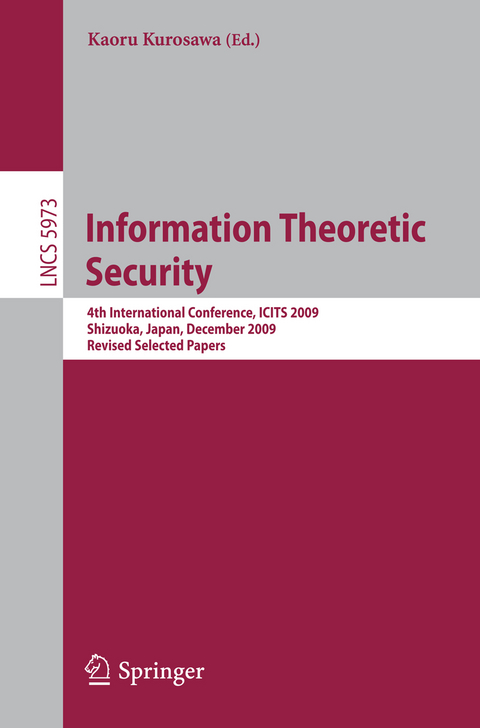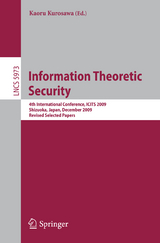Information Theoretic Security
Springer Berlin (Verlag)
9783642144950 (ISBN)
Leakage Resilient Cryptography.- Survey: Leakage Resilience and the Bounded Retrieval Model.- A Lower Bound on the Key Length of Information-Theoretic Forward-Secure Storage Schemes.- Quantum Cryptography and Indistinguishability.- Security of Key Distribution and Complementarity in Quantum Mechanics.- Free-Start Distinguishing: Combining Two Types of Indistinguishability Amplification.- Connection to Computational Security.- Code-Based Public-Key Cryptosystems and Their Applications.- On the Security of Pseudorandomized Information-Theoretically Secure Schemes.- Secret Sharing.- Efficient Statistical Asynchronous Verifiable Secret Sharing with Optimal Resilience.- On the Optimization of Bipartite Secret Sharing Schemes.- Linear Threshold Multisecret Sharing Schemes.- Key Agreement from Common Randomness.- Multiterminal Secrecy Generation and Tree Packing.- Information Theoretic Security Based on Bounded Observability.- Random Graph and Group Testing.- Group Testing and Batch Verification.- Reliable Data Transmision and Computation.- What Can Cryptography Do for Coding Theory?.- Cryptanalysis of Secure Message Transmission Protocols with Feedback.- The Optimum Leakage Principle for Analyzing Multi-threaded Programs.- Fingerprint and Watermarking.- A General Conversion Method of Fingerprint Codes to (More) Robust Fingerprint Codes against Bit Erasure.- An Improvement of Pseudorandomization against Unbounded Attack Algorithms - The Case of Fingerprint Codes.- Statistical-Mechanical Approach for Multiple Watermarks Using Spectrum Spreading.
| Erscheint lt. Verlag | 3.9.2010 |
|---|---|
| Reihe/Serie | Lecture Notes in Computer Science | Security and Cryptology |
| Zusatzinfo | X, 249 p. 23 illus. |
| Verlagsort | Berlin |
| Sprache | englisch |
| Themenwelt | Informatik ► Theorie / Studium ► Kryptologie |
| Schlagworte | Algorithm analysis and problem complexity • algorithms • coding theory • cryptography • Data Transmission • DES • Fingerprinting • Information • Information Hiding • Network Security • privacy and reliability • Quantum Cryptography • security |
| ISBN-13 | 9783642144950 / 9783642144950 |
| Zustand | Neuware |
| Informationen gemäß Produktsicherheitsverordnung (GPSR) | |
| Haben Sie eine Frage zum Produkt? |
aus dem Bereich




